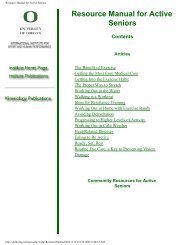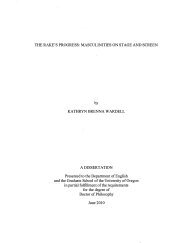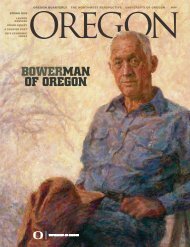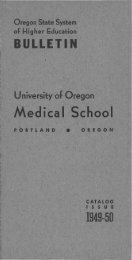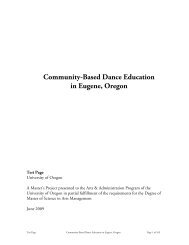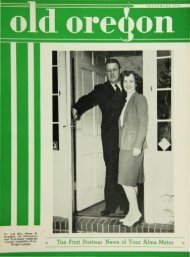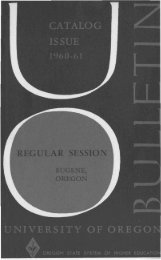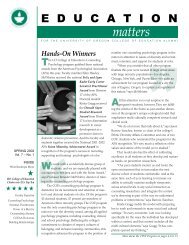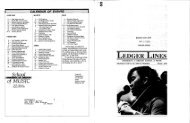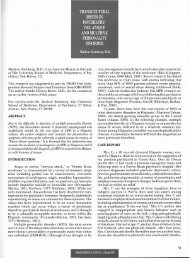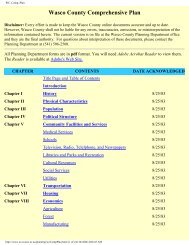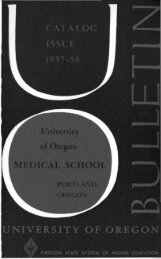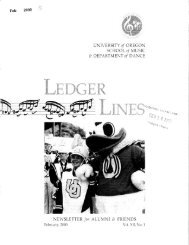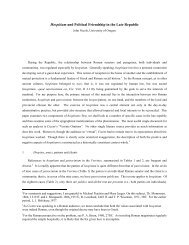~EGULAR SESSION - University of Oregon
~EGULAR SESSION - University of Oregon
~EGULAR SESSION - University of Oregon
You also want an ePaper? Increase the reach of your titles
YUMPU automatically turns print PDFs into web optimized ePapers that Google loves.
342 PROFESSIONAL SCHOOLS<br />
Mus 190. Performance Studies (Private Instruction). 1-4 hours any term.<br />
Individual instruction in the technical and stylistic aspects <strong>of</strong> artistic solo<br />
performance. Students specializing in performance normally enroll for two<br />
half-hour lessons a week (2 term hours <strong>of</strong> credit) in their major instrument<br />
each term during their undergraduate years. Maximum credit in performance<br />
studies for nonmajors, 12 term hours; for candidates for B.A. degree with a<br />
major in music, 24 term hours, including not more than 12 hours during<br />
freshman and sophomore years. Information concerning required levels <strong>of</strong><br />
pr<strong>of</strong>iciency at each level (Mus 190 through Mus 590) may be obtained in the<br />
School <strong>of</strong> Music <strong>of</strong>fice. Prerequisite: audition.<br />
Piano-Bittner, Chodos, Hopkins, Viola-Boughton.<br />
W oods. Cello-Hladky.<br />
Voice-Bailey, Martin, String Bass-Hladky.<br />
N. E. Wilson. Woodwind Instruments-<br />
Organ-Hamilton. Cunningham, Trombley, Vagner.<br />
Harpsichord-Hamilton. Brass Instruments-Lee, Rost.<br />
Violin-Boughton, Maves. Percussion Instruments--Mercer.<br />
Mus 195. Band. 1 hour each term (6 hours maximum credit).<br />
Fall: marching band, laboratory band; winter and spring: concert band, symphoni,:<br />
band. No prerequisites for marching band; audition required for<br />
laboratory, concert, and symphonic band. Lee, Vagner.<br />
Mus 196. Orchestra. 1 hour each term (6 hours maximum credit).<br />
Prerequisite: audition; consent <strong>of</strong> instructor. Boughton.<br />
Mus 197. Chorus. 1 hour each term (6 hours maximum credit).<br />
Prerequisite: audition; consent <strong>of</strong> instructor. Risinger, Vl/i1son, Gustafson.<br />
Mus 201,202,203. Introduction to Music and Its Literature. 3 hours each term.<br />
Cultivation <strong>of</strong> understanding and intelligent enj oyment <strong>of</strong> music through a<br />
study <strong>of</strong> its elements, forms, and historical styles. For nonmajors; music<br />
majors enroll in Mus 204, 205, 206.<br />
Mus 204, 205,206. History <strong>of</strong> Music. 3 hours each term.<br />
Fall: basic stylistic concepts; the classical period through Beethoven. Winter:<br />
the romantic period through Brahms and Mahler. Spring: conservative<br />
trends in the twentieth century. Primarily for music majors. Not open to<br />
students who have had Mus 201, 202, 203. Prerequisite: Mus 121, 122, 123.<br />
Mus 221, 222, 223. Music Theory II. 3 hours each term.<br />
Harmonic, melodic, rhythmic, and basic formal practices since 1700. Written<br />
work correlated with sight singing, analysis, and aural comprehension. Prerequisite:<br />
Mus 123 or equivalent. Bittner, Earls, Maves.<br />
Mus 224,225,226. Keyboard Harmony. 1 hours each term.<br />
Keyboard application <strong>of</strong> the theoretical principles studied in Mus 221, 222,<br />
223; exercises in figured-bass realization, modulation, transposition, and<br />
score reading; development <strong>of</strong> extempore playing. To be taken concurrently<br />
with Mus 221, 222, 223. Prerequisite: Mus 123 or equivalent; satisfactory<br />
rating in test <strong>of</strong> keyboard pr<strong>of</strong>iciency. Earls.<br />
Mus 290. Performance (Private Instruction). 1-4 hours any term.<br />
Prerequisite: pr<strong>of</strong>iciency required for satisfactory completion <strong>of</strong> Mus 190.<br />
For further information, see Mus 190.<br />
UPPER-DIVISION COURSES<br />
Mus 321, 322. Music Fundamentals. 2 hours each term.<br />
Study <strong>of</strong> musical notation and terminology; rudiments <strong>of</strong> sight singing and<br />
ear training; introduction to simple melodic and rhythmic instruments. Designed<br />
to provide students without previous musical training with some<br />
insight into musical language and basic performance skills. Not open to music<br />
majors. Required in the elementary education program and for majors in<br />
recreation leadership and in camping and outdoor education. 1 recitation;<br />
1 two-hour laboratory. Gustafson, Nye, staff.



